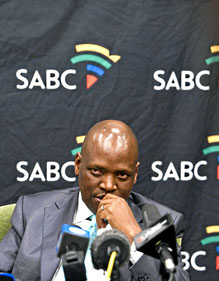
A law firm was appointed to "clear the name" of Hlaudi Motsoeneng before he was made COO of the SABC. Surely it takes a court, not a law firm, to set aside findings made by the public protector? Would his appointment not therefore be unlawful?
Inquiring Mind
Dear Inquiring Mind,
The public protector is an independent institution established under the Constitution. A private law firm is not. Therefore, the decision of the minister of communications to have a private law firm review the public protector's findings is deeply concerning, not least because the minister's conduct evinces both an attitude of contempt and a misunderstanding of the law.
In February 2014 the public protector determined that Motsoeneng's appointment as COO of the SABC was irregular and that he lacked the required qualifications.
She recommended that the SABC take disciplinary steps against Motsoeneng for his dishonesty and improper conduct.
As you rightly note, in July 2014 the minister then elected to ignore the public protector's findings, stating in this publication that: "The SABC appointed an independent law firm to investigate all the issues raised [by the public protector] and I believe that was the responsible way to deal with [it]. The SABC board is satisfied that the report has cleared Motsoeneng of any wrongdoing."
Under the Constitution, the public protector is "independent and subject only to the constitution and the law", and is required to exercise her powers and perform her functions "without fear, favour or prejudice".
The Constitution further places a legal duty on all organs of state (including the minister) to "assist and protect" the public protector to ensure its "independence, impartiality, dignity and effectiveness". Among other things, the constitution and the Public Protector Act grant her broad investigatory and remedial powers, provided that the remedy selected is "appropriate". Our courts have confirmed these principles and held that the public protector is more than a mere ombud, but have not determined whether her findings and recommendations are binding.
Against this background, let's now evaluate the minister's quite inexplicable conduct and reasoning that a private law firm's legal opinion could have "cleared Mr Motsoeneng of wrongdoing", rendering his formal appointment lawful.
- First, if the constitutional independence of the public protector means anything, surely it is that findings of that office cannot be quashed and then ignored by the very institution under investigation.
- Second, the public protector was created to assist public officials to adhere to the law and "to prevent the state from treating the public in an unfair and high-handed manner".
- Third, under the Act it is a criminal offence to do anything in connection with an investigation of the public protector that would analogously amount to contempt of court.
It follows that the minister cannot amend the findings of the public protector merely because she disagrees with them. The minister's only recourse would have been to the courts.
The minister ignored the fact that neither she nor a law firm can review and set aside the findings made and remedial actions required by the public protector. Accordingly, in confirming Motsoeneng's appointment, the minister acted irrationally and hence in an unlawful manner. Her decision to confirm the appointment has now been challenged in court, with the result that the minister's decision is set aside.
Indeed, by asserting that the opinion of private lawyers can supersede the official findings of a constitutional body such as the public protector, the minister could face criminal prosecution for contempt.
• This article was first published in Sunday Times: Business Times

